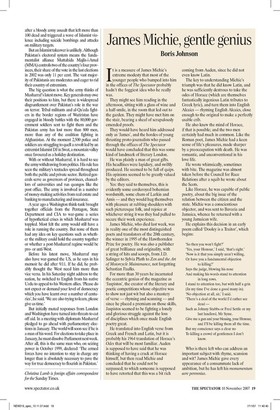Soon we'll see if Musharraf is a man of his word
Christina Lamb says that the President of Pakistan's heart was never really in his negotiations with Benazir Bhutto. Now the key is how the army responds to his state of emergency When their TV screens suddenly went fuzzy on Saturday afternoon, most Pakistanis felt they had seen it all before. Their country has, after all, spent 33 of its 60 years under military rule. The troops surrounding the TV and radio stations, the phone networks down, the round-up of opponents, the concertina wire across Constitution Avenue blocking off the Presidency, Parliament and Supreme Court . . . all these have been a periodic feature of Pakistan's politics.
But this time the army chief imposing what amounted to martial law was himself already the President 'General Musharraf now has the dubious distinction of being the only man in Pakistan's history to have suspended the Constitution twice,' said Husain Haqqani, who has managed to be at various times an adviser to the military, and rival party leaders and former prime ministers Nawaz Sharif and Benazir Bhutto.
Unlike previous coups, the main targets of arrest were not political leaders or militants but judges, lawyers and human rights activists. Seven of the Supreme Court's 11 judges were locked up and the chief justice placed under house arrest. Mushan-af s main aim was to preempt a ruling from the Supreme Court this week which had been expected to declare illegal his recent re-election as President.
One of the first to be arrested was Aitzaz Ahsan, president of the Bar Association, who has led the case opposing Mushan-af s re-election. 'Musharraf is acting like a spoilt child and bad loser,' he said, speaking by phone from the police station in Islamabad where he was being held. 'He is holding the whole country hostage to save his position.'
In fact, most of the nation seemed more interested in Pakistan's cricket tour of rival India which began on Monday. On the BBC website, Pakistanis from across the nation posted messages saying they were so resigned to such events that they had gone back from the announcement of emergency rule to eating their behari kebabs. 'Being honest, these political situations are of no interest to the public as apparently we can't do anything' from Muhamad Ali Khan in Lahore was typical.
Musharraf may have been counting on such indifference. With Nawaz Sharif in exile in Saudi Arabia and Bhutto recovering from the shock of an assassination attempt that killed 140 of her supporters, it has been left to lawyers to lead the protests. The last few days have seen the strange spectacle of portly British-educated middle-aged men in black suits and ties being tear-gassed, beaten by police with sticks and bundled into the back of police pick-ups.
So why are the general and the legal profession at daggers drawn? In his address to the nation explaining his declaration of a state of emergency, Musharraf claimed it was to 'preserve the unity of the country' against the threat of extremists. 'Extremists are roaming around freely in the country, and they are not scared of law-enforcement agencies,' he said.
But no jihadi leaders have been arrested and most of Mushan-af s ire was reserved for the judges. 'They are creating hurdles for democracy,' he complained, adding that their attitude was 'disheartening and demoralising'.
Mushan-af s anger is understandable in the context of Pakistan's history, under which previous military regimes have always been able to rely on the courts for legal cover for their actions. The so-called 'doctrine of necessity' dates back to 1954, with Pakistan's first dismissal of an elected government. The then chief justice Munir ruled that to preserve the country the constitution had to be abandoned.
Since then this ruling has become the basis for every military takeover. In 1958 when General Ayub Khan imposed martial law and dissolved Parliament, the Supreme Court held that the coup was legal in accordance with the doctrine of necessity. Again in 1977, when General Ziaul-Haq dissolved parliament and abrogated the constitution, dismissing Benazir's father Zulfikar Ali Bhutto, the court supported the general's action, once again citing the doctrine of necessity.
Not surprisingly Musharraf expected similar compliance. Nasir Aslam Zahid, a recently retired judge, told Pakistan's Geo TV that when he and other Supreme Court judges were summoned by Musharraf to take their new oath of office in January 2000, shortly after the coup, they were presented with blank pieces of paper. They took their oaths without seeing any text.
But over the last year the Supreme Court has suddenly discovered its independence. Its unlikely inspiration has been the chief justice Iftikhar Chaudhry, a solemn man with a black moustache and ponderous speaking style.
As is clear from his recently published memoir, Musharraf is not a man to admit mistakes readily. But when he looks back he must surely concede that it was an enormous blunder in March trying to oust Chaudhry, who had ruled against the government on a series of corruption cases. Musharraf accused him of misconduct such as demanding an expensive Mercedes -Benz as his official car.
Demonstrations by lawyers for Chaudhry to be reinstated turned into a nationwide movement with huge rallies and people openly calling for Musharraf to step down. Eventually the President reinstated him in July in a humiliating climbdown.
But the battlelines were drawn. When Musharraf was re-elected President on 11 October by the same Parliament that elected him five years ago, Chaudhry called on the Supreme Court to reject this. An alleged attempt to blackmail judges with videos of family members in compromising positions backfired. A desperate Musharraf saw the only way he could stay in power was to abrogate the constitution and sack the court that was about to remove him.
Mushan-af s action has left Washington and Whitehall floundering. Post 9/11, Pakistan's key geo-strategic position neighbouring Afghanistan and Iran had transformed the general from international pariah into the West's closest ally. Bush called him 'my best friend' and officials in Britain and the US now admit they had a 'Musharraf policy' rather than a Pakistan policy.
As Musharraf's popularity has plummeted, officials on both sides of the Atlantic have spent the last six months trying to convince him not to impose a state of emergency, including a 2 a.m. call from Condi Rice back in August. Instead they persuaded him to agree a deal with Benazir Bhutto to give his regime a 'democratic face'. After prickly negotiations, including a face-to-face meeting with Bhutto in Abu Dhabi, he agreed to drop corruption charges allowing her to return from exile in exchange for her support.
But his heart was never really in it. I interviewed him in November 1999 shortly after he seized power and he said he blamed Bhutto more than anyone for the situation and vowed he would never let her back into power.
When Bhutto's bus was bombed in Karachi on her return three weeks ago, many suspected the regime was involved. Her security advisor Rehman Malik immediately said `Musharraf will use this to declare martial law'.
Musharraf might currently control all the levers of power but it's hard to see where he goes from here. Unlike previous coups which have tended to be against unpopular governments and often welcomed, this one has almost no support from any sector of the community.
The nightmare scenario for the West is Islamic revolution, particularly the idea that someone like Mullah Omar could get their hands on the button of Pakistan's nuclear bomb. Almost all al-Qa'eda attacks over the last few years, including the 7/7 bombings in London, have involved Pakistani connections. The last few years have seen the Islamists growing in number and influence in Pakistan, particularly in universities. This was brought home late last year when the Red Mosque in the very heart of the capital was taken over by Taleban sympathisers. The occupation was only ended after a bloody army assault that left more than 100 dead and triggered a wave of Islamist violence including suicide bombings and attacks on military targets.
But an Islamist takeover is unlikely. Although Pakistan's electoral system means the fundamentalist alliance Muttahida Majlis-i-Amal (M MA) controls two of the country's four provinces, their share of the vote in the last elections in 2002 was only 11 per cent. The vast majority of Pakistanis are moderates and eager to rid their country of extremism.
The big question is what the army thinks of Mushan-af's latest move. Key generals may owe their positions to him, but there is widespread disgruntlement over Pakistan's role in the war on terror. Tribal militants and al-Qa'eda fighters in the border regions of Waziristan have engaged in bloody battles with the 80,000 government soldiers sent to fight them and the Pakistan army has lost more than 800 men, more than any of the coalition fighting in Afghanistan. At the moment 2,500 police and soldiers are struggling to quell a revolt led by an extremist Islamist DJ in Swat, a mountain valley once favoured as a holiday destination.
With or without Mushan-af, it is hard to see the army withdrawing from politics. His rule has seen the military's tentacles spread throughout both the public and private sector. Retired generals serve as governors of provinces, chancellors of universities and run quangos like the post office. The army is involved in a number of money-making activities from real estate and banking to manufacturing and insurance.
A year ago a Washington think-tank brought together officials from the Pentagon, State Department and CIA to war-game a series of hypothetical crises in which Mushan-af was toppled. Most felt the army would still have a role in running the country. But none of them had any idea on key questions such as whether the military could hold the country together or whether a post-Mushan-af regime would be proor anti-West.
Before his latest move, Mushan-af may also have war-gamed the US, as he says in his memoir he did after 9/11. If he did, he probably thought the West need him more than vice versa. In his Saturday night address to the nation, he switched to English from his native Urdu to appeal to his Western allies. 'Please do not expect or demand your level of democracy which you have learnt over a number of centuries', he said. 'We are also trying to learn, please give us time.'
But initially muted responses from London and Washington have turned into threats to cut off aid. In a meeting with diplomats Mushan-af pledged to go ahead with parliamentary elections in January. The world will soon see if he is a man of his word. For elections to take place in January, he must dissolve Parliament next week. After all, this is the same man who, on seizing power in October 1999, declared: The armed forces have no intention to stay in charge any longer than is absolutely necessary to pave the way for true democracy to flourish in Pakistan.'






































































 Previous page
Previous page